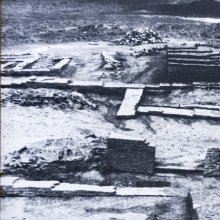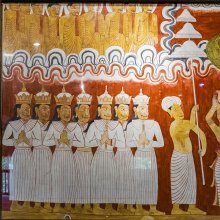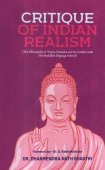Purva, Pūrvā, Pūrva: 25 definitions
Introduction:
Purva means something in Buddhism, Pali, Hinduism, Sanskrit, Jainism, Prakrit, the history of ancient India, Marathi, Hindi. If you want to know the exact meaning, history, etymology or English translation of this term then check out the descriptions on this page. Add your comment or reference to a book if you want to contribute to this summary article.
Images (photo gallery)
(+6 more images available)
In Hinduism
Vyakarana (Sanskrit grammar)
Source: Wikisource: A dictionary of Sanskrit grammarPūrva (पूर्व).—(l) ancient, old: (2) belonging to the Eastern districts. The word is frequently used as qualifying the word आचार्य (ācārya) where it means ancient.

Vyakarana (व्याकरण, vyākaraṇa) refers to Sanskrit grammar and represents one of the six additional sciences (vedanga) to be studied along with the Vedas. Vyakarana concerns itself with the rules of Sanskrit grammar and linguistic analysis in order to establish the correct context of words and sentences.
Shaivism (Shaiva philosophy)
Source: Brill: Śaivism and the Tantric Traditions (philosophy)Pūrva (पूर्व) refers to a “previous (experience)” according to the Utpaladeva’s Vivṛti on Īśvarapratyabhijñākārikā 1.5.8-9.—Accordingly, “For inference is a concept, and this [concept] arises thanks to the residual trace [left by] a previous experience (pūrva-anubhava); so to begin with, [it] depends on the fact that the object was directly perceived [at some point] in the past, and inference is a conceptual cognition that arises as an unfailing [means of knowledge] with respect to this [previously perceived] object. [...]”.

Shaiva (शैव, śaiva) or Shaivism (śaivism) represents a tradition of Hinduism worshiping Shiva as the supreme being. Closely related to Shaktism, Shaiva literature includes a range of scriptures, including Tantras, while the root of this tradition may be traced back to the ancient Vedas.
Vastushastra (architecture)
Source: Brill: Śaivism and the Tantric Traditions (architecture)Pūrva (पूर्व) refers to the “eastern” (direction), according to the Devyāmata (chapter 105).—Accordingly, [while describing the layout of the residence (gṛha) for the prāsādāśramin]—“[...] To the north is general storage. Not too far away, nor adjoining, is a secluded, sheltered lavatory building, aside from the residence. To the east (pūrva) should be made a copse, and trees with flowers and fruit. [...]”.

Vastushastra (वास्तुशास्त्र, vāstuśāstra) refers to the ancient Indian science (shastra) of architecture (vastu), dealing with topics such architecture, sculpture, town-building, fort building and various other constructions. Vastu also deals with the philosophy of the architectural relation with the cosmic universe.
Pancaratra (worship of Nārāyaṇa)
Source: University of Vienna: Sudarśana's Worship at the Royal Court According to the AhirbudhnyasaṃhitāPūrvā (पूर्वा) refers to the “first” (level of Kriyāśakti—‘creative energy’), according to the Ahirbudhnyasaṃhitā, belonging to the Pāñcarātra tradition which deals with theology, rituals, iconography, narrative mythology and others.—Accordingly, “A ruler who is a Universal Sovereign is entitled to the first (pūrvā), a Provincial Governor to the second and a District Governor to the third [level of] Creative Energy. [To the same are entitled] a chief minister or a twice-born, provided he is in charge of the protection of many people. No single man is entitled to [deploy] Her for [just] another man”.

Pancaratra (पाञ्चरात्र, pāñcarātra) represents a tradition of Hinduism where Narayana is revered and worshipped. Closeley related to Vaishnavism, the Pancaratra literature includes various Agamas and tantras incorporating many Vaishnava philosophies.
Sports, Arts and Entertainment (wordly enjoyments)
Source: archive.org: Syainika Sastra of Rudradeva with English Translation (art)Pūrva (पूर्व) refers to “previous existences”, according to the Śyainika-śāstra: a Sanskrit treatise dealing with the divisions and benefits of Hunting and Hawking, written by Rājā Rudradeva (or Candradeva) in possibly the 13th century.—Accordingly, “[...] Moreover, charming couplets are often heard chanted by the Manes for the welfare of Ruci, who was for renouncing the world:—‘O darling, man’s karma accumulated in previous existences (pūrva-karman) [pūrvakarma kṛtaṃ], that is, his merits und demerits, wears away day and night by his “enjoyments,” that is, his experiences of the joys and sorrows of life. Therefore you, who know what dharma is, will attain peace when your karma wears away’”.

This section covers the skills and profiencies of the Kalas (“performing arts”) and Shastras (“sciences”) involving ancient Indian traditions of sports, games, arts, entertainment, love-making and other means of wordly enjoyments. Traditionally these topics were dealt with in Sanskrit treatises explaing the philosophy and the justification of enjoying the pleasures of the senses.
In Buddhism
Mahayana (major branch of Buddhism)
Source: Wisdom Library: Maha Prajnaparamita Sastra1) Pūrvā (पूर्वा, “east”) represents one of the “ten directions” (diś in Sanskrit or disā in Pali) according to an appendix included in the 2nd century Mahāprajñāpāramitāśāstra (chapter XIV). Pūrvā is a Sanskrit word which is known in Pali as purimā or puratthimā, in Tibetan as śar and in Chinese as tong.
2) Pūrva (पूर्व) or Pūrvaduḥkha refers to “old suffering”, according to Mahāprajñāpāramitāśāstra (chapter 31).—Accordingly, “[...] Recent suffering (navaduḥkha) is ‘happiness’ (sukha) [in contrast] to the old suffering (pūrvaduḥkha) which is ‘suffering’. Thus, when one sits down one feels happiness, but when this position persists, it gives rise to suffering. At the beginning, walking, standing and lying down are happiness, but in the end they too are suffering. Whether one is bending or one is stretching, whether one is bowing the head or raising it, whether one looks straight ahead or to the side, whether one is breathing out or breathing in, suffering always follows the body. From conception and birth to death, there is not a single moment of happiness”.
Source: academia.edu: A Study and Translation of the GaganagañjaparipṛcchāPūrva (पूर्व) refers to the “beginning (of the night)”, according to the Gaganagañjaparipṛcchā: the eighth chapter of the Mahāsaṃnipāta (a collection of Mahāyāna Buddhist Sūtras).—Accordingly, as Gaganagañja said to Ratnapāṇi: “Son of good family, those sixty-four dharmas are included in one hundred twenty-eight dharmas. What are those one hundred twenty-four? [...] (59) the lightness of body is included in knowing the proper time for eating and making an effort at practicing vigilance in the beginning (pūrva-rātra) and end of the night (apara-rātra); (60) lightness of thought is included in eagerness and examination; (61) being free from lassitude is included in impermanence and suffering; (62) desire is included in the absence of what belongs to the ego and property; [...]’”.

Mahayana (महायान, mahāyāna) is a major branch of Buddhism focusing on the path of a Bodhisattva (spiritual aspirants/ enlightened beings). Extant literature is vast and primarely composed in the Sanskrit language. There are many sūtras of which some of the earliest are the various Prajñāpāramitā sūtras.
Tibetan Buddhism (Vajrayana or tantric Buddhism)
Source: Brill: Śaivism and the Tantric Traditions (tantric Buddhism)Pūrva (पूर्व) refers to the “east” (i.e., ‘the eastern direction’), according to the Nāmamantrārthāvalokinī by Vilāsavajra, which is a commentary on the Nāmasaṃgīti.—Accordingly, [while describing Ādibuddha]—“[...] [The Ādibuddha] has five faces. [...] [His five faces] have five [different] colours: dark blue for the east (pūrva—pūrveṇa nīlaṃ) [and forward-facing face], yellow for the south, red for the west, [and] green for the north. On the top, he has a white face, the face of [the deity] Paramāśva. [...]”.
Source: OSU Press: Cakrasamvara SamadhiPūrva (पूर्व) refers to the “eastern direction” (or bank of a river) [i.e., keśāvatyāḥ pūrva-digbhāge], according to the Guru Mandala Worship (maṇḍalārcana) ritual often performed in combination with the Cakrasaṃvara Samādhi, which refers to the primary pūjā and sādhanā practice of Newah Mahāyāna-Vajrayāna Buddhists in Nepal.

Tibetan Buddhism includes schools such as Nyingma, Kadampa, Kagyu and Gelug. Their primary canon of literature is divided in two broad categories: The Kangyur, which consists of Buddha’s words, and the Tengyur, which includes commentaries from various sources. Esotericism and tantra techniques (vajrayāna) are collected indepently.
In Jainism
General definition (in Jainism)
Source: archive.org: TrisastisalakapurusacaritraPūrva (पूर्व) refers to a time-unit equaling 8,400,0002 years.
Source: Encyclopedia of Jainism: Tattvartha Sutra 9: Influx of karmasPūrva (पूर्व).—The scriptures prior to Mahāvīra are called pūrvas.

Jainism is an Indian religion of Dharma whose doctrine revolves around harmlessness (ahimsa) towards every living being. The two major branches (Digambara and Svetambara) of Jainism stimulate self-control (or, shramana, ‘self-reliance’) and spiritual development through a path of peace for the soul to progess to the ultimate goal.
India history and geography
Source: Cologne Digital Sanskrit Dictionaries: Indian Epigraphical GlossaryPūrva.—(IE 7-1-2), sometimes used to indicate ‘fourteen’. Note: pūrva is defined in the “Indian epigraphical glossary” as it can be found on ancient inscriptions commonly written in Sanskrit, Prakrit or Dravidian languages.
--- OR ---
Pūrvā.—(IE 8-8; CII 4; ML), ‘the above’; ‘the aforesaid (tithi or praśasti)’; used with reference to a tithi and a praśasti; sometimes wrongly used as a synonym of a tithi or praśasti. Cf. anupūrvī used with reference to a tithi. Note: pūrvā is defined in the “Indian epigraphical glossary” as it can be found on ancient inscriptions commonly written in Sanskrit, Prakrit or Dravidian languages.

The history of India traces the identification of countries, villages, towns and other regions of India, as well as mythology, zoology, royal dynasties, rulers, tribes, local festivities and traditions and regional languages. Ancient India enjoyed religious freedom and encourages the path of Dharma, a concept common to Buddhism, Hinduism, and Jainism.
Languages of India and abroad
Marathi-English dictionary
Source: DDSA: The Molesworth Marathi and English Dictionarypūrva (पूर्व).—f or pūrvadiśā f (pūrvā S) The east. Pr. rājā karīla tī pūrvadiśāorsāṅgāla tī pūrvadiśā Whichsoever quarter the king (or you) may please to say is the east, that is the east. A form of expression implying Obsequiousness or abject admitting and consenting.
--- OR ---
pūrva (पूर्व).—a (S) Eastern or easterly. 2 First, former, prior, preceding, initial. It is in comp. affixed as well as prefixed; as dṛṣṭapūrva, śrutapūrva, uktapūrva, pūrvadṛṣṭa &c. Seen, heard, spoken &c. before. See further compounds in order. This word, with ka attached, enters into many combinations valuable to the translator from English. Its sense if explicated is still First, preceding, antecedent; but its service or force is that of With, together with. Ex. āgrahapūrvaka With importunity; i. e. importunity preceding or being first. See other examples under क.
--- OR ---
pūrvā (पूर्वा).—f pl (S) The eleventh of the lunar asterisms.
Source: DDSA: The Aryabhusan school dictionary, Marathi-Englishpūrva (पूर्व).—f pūrvadiśā f The east. Pr. rājā karīla tī pūrvadiśāṃ Whichsoever quarter the king may please to name the east, that is the east. A form of expression implying. Obsequiousness or abject admitting and consenting.
--- OR ---
pūrva (पूर्व).—a Eastern. First, former.
--- OR ---
pūrvā (पूर्वा).—f pl The eleventh of the lunar as- terisms.
Marathi is an Indo-European language having over 70 million native speakers people in (predominantly) Maharashtra India. Marathi, like many other Indo-Aryan languages, evolved from early forms of Prakrit, which itself is a subset of Sanskrit, one of the most ancient languages of the world.
Sanskrit dictionary
Source: DDSA: The practical Sanskrit-English dictionaryPūrva (पूर्व).—a. (Declined like a pronoun when it implies relative position in time or space, but optionally so in nom. pl.; and abl. and loc. sing.)
1) Being in front of, first, foremost.
2) Eastern, easterly, to the east of; ग्रामात् पर्वतः पूर्वः (grāmāt parvataḥ pūrvaḥ) Sk.; पूर्वापरौ तोयनिधी वगाह्य (pūrvāparau toyanidhī vagāhya) Kumārasambhava 1.1.
3) Previous to, earlier than; ब्राह्मणे साहसः पूर्वः (brāhmaṇe sāhasaḥ pūrvaḥ) Manusmṛti 8.276.
4) Old, ancient; पूर्वसूरिभिः (pūrvasūribhiḥ) R.1.4; इदं कविभ्यः पूर्वेभ्यो नमोवाकं प्रशास्महे (idaṃ kavibhyaḥ pūrvebhyo namovākaṃ praśāsmahe) Uttararāmacarita 1.1.
5) Former, previous, anterior, prior, antecedent (opp. uttara); in this sense often at the end of comp. and translated by 'formerly.' or 'before'; श्रुतपूर्व (śrutapūrva) &c.; व्यतीता या निशा पूर्वा पौराणां हर्षवर्धिनी (vyatītā yā niśā pūrvā paurāṇāṃ harṣavardhinī) Rām.7.37.1.
6) Aforesaid, before-mentioned.
7) Initial.
8) Established, customary, of long standing
9) Early, prime, पूर्वे वयसि (pūrve vayasi) Pañcatantra (Bombay) 1.165 'in early age or prime of life.
1) Elder (jyeṣṭha); रामः पूर्वो हि नो भ्राता भविष्यति महीपतिः (rāmaḥ pūrvo hi no bhrātā bhaviṣyati mahīpatiḥ) Rām.2.79.8.
11) (At the end of comp.) Preceded by, accompanied by, attended with; संबन्धमा भाषणपूर्वमाहुः (saṃbandhamā bhāṣaṇapūrvamāhuḥ) R.2.58; पुण्यः शब्दो मुनिरिति मुहुः केवलं राजपूर्वः (puṇyaḥ śabdo muniriti muhuḥ kevalaṃ rājapūrvaḥ) Ś2.17; तान् स्मितपूर्वमाह (tān smitapūrvamāha) Kumārasambhava 7.47; बहुमानपूर्वया (bahumānapūrvayā) 5.31; दशपूर्वरथं यमाख्यया दशकण्ठारिगुरुं विदुर्बुधाः (daśapūrvarathaṃ yamākhyayā daśakaṇṭhāriguruṃ vidurbudhāḥ) R.8.29; so मतिपूर्वम् (matipūrvam) Manusmṛti 11.147 'intentionally', 'knowingly'; 12.89; अबोधपूर्वम् (abodhapūrvam) 'unconsciously', Ś.5.2. &c.
-rvaḥ An ancestor, a forefather; पूर्वैः किलायं परिवर्धितो नः (pūrvaiḥ kilāyaṃ parivardhito naḥ) R.13.3; पयः पूर्वैः सनिश्वासैः कवोष्णमुपभुज्यते (payaḥ pūrvaiḥ saniśvāsaiḥ kavoṣṇamupabhujyate) 1.67;5.14; अनुकारिणि पूर्वेषां युक्तरूपमिदं त्वयि (anukāriṇi pūrveṣāṃ yuktarūpamidaṃ tvayi) Ś.2.17.
-rvam The forepart; अनवरतधनुर्ज्यास्फालनक्रूरपूर्वम् (anavaratadhanurjyāsphālanakrūrapūrvam) (gātram) Ś.2.4.
-rvā 1 The east
2) Name of a country to the east of Madhyadeśa.
-rvam ind.
1) Before (with abl.); मासात् पूर्वम् (māsāt pūrvam).
2) Formerly, previously, at first, antecedently, beforehand; तं पूर्वमभिवादयेत् (taṃ pūrvamabhivādayet) Manusmṛti 2.117;3.94;8.25;; R. 12.35; प्रणिपातपूर्वम् (praṇipātapūrvam) K; भूतपूर्वखरालयम् (bhūtapūrvakharālayam) Uttararāmacarita 2.17 'which formerly was the abode', &c.; समयपूर्वम् (samayapūrvam) Ś.5. 'after a formal agreement.'
3) Immemorially. (pūrveṇa 'in front', 'before', 'to the east of', with gen. or acc.; adya pūrvam 'till-now', 'hitherto'; [pūrvaḥ -tataḥ -paścāt -upari] 'firstthen, first-afterwards', 'previously, subsequently', [pūrvam -adhunā] or -adya 'formerly-now.'
Source: Cologne Digital Sanskrit Dictionaries: Shabda-Sagara Sanskrit-English DictionaryPūrva (पूर्व) or Pūrvva.—mfn.
(-rvaḥ-rvī-rvaṃ) 1. First, former, prior, preceding, initial. 2. East, eastern. 3. All, entire. 4. Before, in front of. m. plu.
(-rvāḥ) Ancestors, forefathers. f.
(-rbbā) The east. n.
(-rvaṃ) An ancient tradition. E. pūrbba or pūrva to fill, to dwell, &c. aff. ac; hence to derivative and its compounds may be written either with va or va; the second of the duplicate consonants may also be rejected, making it pūrba or pūrva .
Source: Cologne Digital Sanskrit Dictionaries: Benfey Sanskrit-English DictionaryPūrva (पूर्व).—i. e. pura + va (see purā), also pārba, adj., f. vā (bā). 1. Fore, [Śākuntala, (ed. Böhtlingk.)] [distich] 37. 2. Former, prior, Böhtl. Ind. Spr. 905. 3. First, [Mānavadharmaśāstra] 1, 10. 4. Lowest, [Mānavadharmaśāstra] 8, 120. 5. Eastern, [Mānavadharmaśāstra] 2, 22. Ii. adv. vam. 1. Before,
Pūrva (पूर्व).—[adjective] being before ([space and time]), fore, first, eastern, to the east of ([ablative]); prior, preceding, ancient, previous to, earlier than ([ablative] or —°, often °— or —° [with] [participle] in the sense of an [adverb], e.[grammar] pūrvokta or uktapūrva spoken before or already); accompanied by, following; with, under, according to (—°); [with] vayas [neuter] youth; [with] āyus [neuter] old age. —[masculine] elder brother, [plural] the ancestors or ancients. [feminine] pūrvā (±diś) the east. [neuter] forepart, as [adverb] in front, before (as [preposition] [with] [ablative]), first, previously, already, long since; —° accompanied by etc. (cf. adj. —°). pūrva uttara former-latter, [neuter] [adverb] first-last; adya pūrvam until now, hitherto.
Source: Cologne Digital Sanskrit Dictionaries: Monier-Williams Sanskrit-English Dictionary1) Pūrva (पूर्व):—mf(ā)n. (connected with purā, puras, pra, and declined like a [pronoun] when implying relative position whether in place or time, but not necessarily in [ablative] [locative case] sg. m. n. and [nominative case] [plural] m.; See, [Pāṇini 1-1, 27; 34; vii, 1, 16]) being before or in front, fore, first, [Ṛg-veda] etc. etc.
2) eastern, to the east of ([ablative]), [ib.]
3) former, prior, preceding, previous to, earlier than ([ablative] or [compound]), [ib.] (gaja-pūrva, preceding the number ‘eight’ id est. seven, the seventh, [Śrutabodha]; māsena p or māsa-p, earlier by a month, [Pāṇini 2-1, 31]; ifc. often = formerly or before e.g. strī-p, f° a wife; āḍhya-p, f° wealthy; [especially] after a pp. e.g. kṛta-p, done before, dṛṣṭa-p, seen b°; ifc. also preceded or accompanied by, attended with e.g. smita-pūrvā-vāk, speech accompanied by smiles; sometimes not translatable e.g. mṛdu-pūrvā vāk, kind speech)
4) ancient, old, customary, traditional, [Ṛg-veda] etc. etc.
5) first (in a series), initial, lowest (opp. to uttara; with dama or sāhasa ‘the lowest fine’), [Manu-smṛti viii, 120 etc.]
6) (with vayas) ‘first age’, youth, [Mahābhārata]
7) foregoing, aforesaid, mentioned before ([ablative]), [Manu-smṛti; Mahābhārata; Pāṇini]
8) m. an ancestor, forefather ([plural] the ancients, ancestors), [Ṛg-veda] etc. etc.
9) an elder brother, [Rāmāyaṇa]
10) Name of a prince, [Bhāgavata-purāṇa]
11) Pūrvā (पूर्वा):—[from pūrva] f. (with or sc. diś) the east, [Mahābhārata; Rāmāyaṇa]
12) [v.s. ...] Name of a country to the east of Madhya-deśa, [cf. Lexicographers, esp. such as amarasiṃha, halāyudha, hemacandra, etc.]
13) [v.s. ...] of the Nakṣatras Pūrva-phalgunī, Pūrvāṣāḍhā and Pūrvabhadrapadā collectively, [Varāha-mihira]
14) Pūrva (पूर्व):—n. the fore part, [Śakuntalā ii, 4] (cf. [Pāṇini 2-2, 1])
15) a [particular] high number (applied to a period of years), [Buddhist literature]
16) Name of the most ancient of Jaina writings (of which 14 are enumerated), [cf. Lexicographers, esp. such as amarasiṃha, halāyudha, hemacandra, etc.]
17) Name of a Tantra, [Catalogue(s)]
18) an ancient tradition, [Horace H. Wilson]
Source: Cologne Digital Sanskrit Dictionaries: Yates Sanskrit-English Dictionary1) Purva (पुर्व):—purvati 1. a. To fill. (ka) purvayati 10. a. To inhabit; to invite.
2) Pūrva (पूर्व):—pūrvvati 1. a. To fill. (ka) pūrvvayati 10. a. To dwell; to invite.
3) [(rvvaḥ-rvvā-rvvaṃ) a.] First, former; eastern; all, entire; before. f. East. n. Ancient tradition. m. plu. pūrvvāḥ forefathers.
Source: DDSA: Paia-sadda-mahannavo; a comprehensive Prakrit Hindi dictionary (S)Pūrva (पूर्व) in the Sanskrit language is related to the Prakrit words: Puratthima, Puratthimā, Puvva, Puvvā, Puvvilla.
[Sanskrit to German]
Sanskrit, also spelled संस्कृतम् (saṃskṛtam), is an ancient language of India commonly seen as the grandmother of the Indo-European language family (even English!). Closely allied with Prakrit and Pali, Sanskrit is more exhaustive in both grammar and terms and has the most extensive collection of literature in the world, greatly surpassing its sister-languages Greek and Latin.
Hindi dictionary
Source: DDSA: A practical Hindi-English dictionary1) Purva in Hindi refers in English to:—(nm) a hamlet, small village; a small earthen pot; (nf) easterly wind..—purva (पुरवा) is alternatively transliterated as Puravā.
2) Pūrva (पूर्व) [Also spelled purv]:—(nm) the east; (a) former; previous, preceding, prior; anterior; fore—; ~[kathana] prediction; —[kathā] tie-in, the earlier story; —[karma] previous deeds/actions; ~[kalpanā] preconception; ~[kalpita] preconceived; anticipated; ~[kalpī] anticpative; ~[kāṃsya yuga] early bronze age; ~[kāla] past, former times, olden days; ~[kālika] past, belonging to former times, ancient; •[kriyā] absolutive verb; ~[kālika kṛdaṃta] absolutive participle; ~[kālīna] past, of the past, of previous times/days/age; ~[kṛta] done or committed previously; ~[gata] preceding, prior, former; ~[gāmitā] backwardness; ~[gāmī] preceding, prior, former; ~[gṛhīta] presupposed; biassed, prejudiced; ~[graha] bias, prejudice; ~[ciṃtana] premeditation; prior comprehension; ~[cetana] preconscious, preconscious mind; ~[ja] ancestor(s); ~[janma] previous birth; —[jīvana] pre-existence; former life; —[jñāna] anticipation; foresight, foreknowledge; inkling; ~[tā] precedence; priority; ~[datta] given previously; ~[darśana] preview; ~[dhāraṇā] presumption; concept; notion; ~[niyata] predestined; appointed earlier; ~[niyati] destiny; ~[nirṇaya] prejudgment; predetermination; earlier decision/resolution; ~[niścita] predecided; predestined; resolved earlier; ~[pakṣa] the first objection to an assertion in a discussion; the first statement of the plaintiff; plaint; proposition; the first half of the lunar month; ~[pada] the first member of a compound word; ~[pīṭhikā] background; introduction; prolegomenon; ~[puruṣa] a progenitor; ancestor(s), forefather(s); ~[pratyaya]([na]) preconception; ~[bhūta] existing previously; former; late; ~[mīmāṃsā] one of the six systems of Indian philosophy attributed to the savant Jaimini: who, in interpreting the Vedic texts, discusses the eternity of the sound identified with [brahma; ~mudra] pre-print; ~[yāyī] preceding; a predecessor; ~[raṃga] prologue, prelude of a drama, overture; ~[rāga] incipient affection; courtship; ~[rūpa] previous form; prognosis; ~[lekha] a protocol; antescript; ~[vat] as before; in tact; ~[vartitā] precedence; priority; ~[vartī] previous, prior, preceding, precedent, happening before; a predecessor; ~[vādī] a plaintiff; ~[vicārita] forethought; preconceived; deliberated upon earlier; ~[vid] one who knows previous things; ~[vṛtta] antecedents; anteposition; ~[sūcaka] premonitory.
...
Kannada-English dictionary
Source: Alar: Kannada-English corpusPūrva (ಪೂರ್ವ):—
1) [adjective] of or in time long past; ancient.
2) [adjective] relating to or occurred in the early or first part of one’s life.
3) [adjective] came or occurred before present time.
4) [adjective] preceding all others in time; first.
5) [adjective] lying toward, situated in or coming from the east.
--- OR ---
Pūrva (ಪೂರ್ವ):—
1) [noun] the time gone by; past.
2) [noun] that which has or had happened in the past; history.
3) [noun] a thing which preceds all others in time; the first one.
4) [noun] the rear portion; back side.
5) [noun] the direction in which sun appears to rise; the east.
6) [noun] a person of the past; an ancestor.
7) [noun] any of the fourteen jainaāgamas (religious scriptures).
8) [noun] a period of seventy lakh fifty six crore years.
9) [noun] (math.) a symbol for the number fourteen.
10) [noun] a breathing in and out continuously (without retaining the breath inside or restraining from taking the breath in) as a yogic exercise.
11) [noun] the Eastern countries, esp. the Asian countries.
12) [noun] ಪೂರ್ವದ ಹಳಗನ್ನಡ [purvada halagannada] pūrvada haḷagaṇṇaḍa the earliest form of Kannaḍa language (previous to 9th century A.D.).
Kannada is a Dravidian language (as opposed to the Indo-European language family) mainly spoken in the southwestern region of India.
See also (Relevant definitions)
Starts with (+627): Purivapranidhana, Purva Mimamsa, Purva-bhujyamana-deva-brahmana-kshetra-khandalakam-varjayitva, Purva-bhuktaka-bhujyamana-deva-brahma-daya-varjita, Purva-maryada, Purva-pratta-deva-brahma-deya-rahita, Purva-punniyastanam, Purva-raja, Purva-riti, Purva-siddha-ayatana, Purvaagrah, Purvaalap, Purvaanubhava, Purvaanubhavi, Purvabadha, Purvabandhu, Purvabhadra, Purvabhadrapada, Purvabhadrapadanakshatra, Purvabhadrapade.
Ends with (+108): Abdapurva, Abhatapurva, Abhipurva, Abhisamdhipurva, Abhuktapurva, Abhutapurva, Abodhapurva, Abuddhipurva, Adattapurva, Adhyapurva, Adrishtapurva, Adyapurva, Ahampurva, Ahapurva, Ajatapurva, Ajnatapurva, Akrishnapurva, Akritapurva, Alampurva, Alanghitapurva.
Full-text (+1415): Purvam, Puratthima, Purvashaila, Purvahna, Anyapurva, Purvabhyasa, Purvadeha, Bhutapurvam, Tatpurvam, Purvajati, Purvarupa, Purvapitamaha, Purvabhashin, Purvavada, Purvadikpati, Dakshinapurva, Purvacodita, Purvaratra, Purvashirsha, Matipurva.
Relevant text
Search found 172 books and stories containing Purva, Pūrvā, Pūrva; (plurals include: Purvas, Pūrvās, Pūrvas). You can also click to the full overview containing English textual excerpts. Below are direct links for the most relevant articles:
Vasudevavijaya of Vasudeva (Study) (by Sajitha. A)
Bahuvrīhi-samāsa (Compound) < [Chapter 3 - Vāsudevavijaya—A Grammatical Study]
Avyayībhāva-samāsa (Compound) < [Chapter 3 - Vāsudevavijaya—A Grammatical Study]
Dvandva-samāsa (Compound) < [Chapter 3 - Vāsudevavijaya—A Grammatical Study]
Rig Veda (translation and commentary) (by H. H. Wilson)
Tattvartha Sutra (with commentary) (by Vijay K. Jain)
Verse 3.21 - The direction of the first of each pair of rivers < [Chapter 3 - The Lower World and the Middle World]
Verse 1.20 - Scriptural knowledge (śrutajñāna) < [Chapter 1 - Right Faith and Knowledge]
Verse 3.31 - The duration of life in the five Videha regions < [Chapter 3 - The Lower World and the Middle World]
Manusmriti with the Commentary of Medhatithi (by Ganganatha Jha)
Verse 8.120 < [Section XX - Penalty for Perjury]
Verse 4.93 < [Section XI - Daily Duties]
Verse 2.101 < [Section XIX - Twilight Prayers]
Katha Upanishad with Shankara’s Commentary (by S. Sitarama Sastri)
Verse 2.1.6 < [Adyaya II, Valli I - The nature of Atman and its importance]
Garga Samhita (English) (by Danavir Goswami)
Verse 5.18.8 < [Chapter 18 - Uddhava Hears the Gopīs’ Words and Returns to Mathurā]
Verses 4.1.26-27 < [Chapter 1 - The Story of the Personified Vedas]
Verse 6.16.17 < [Chapter 16 - Seeing Śrī Rādhā’s Form]
Related products










